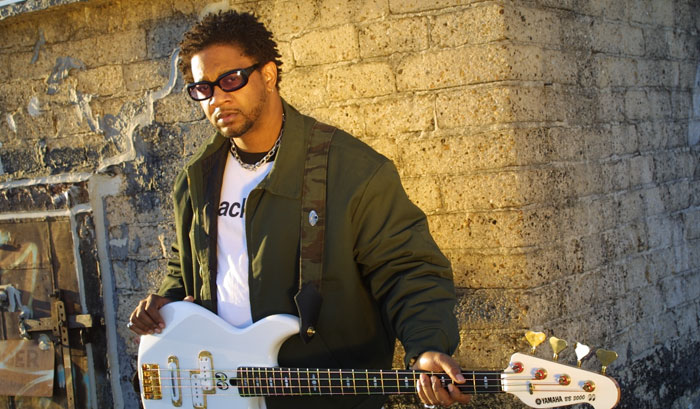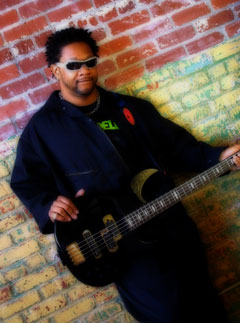


Bassist Preston Crump carries the torch for realtime bass playing in the sequencer-driven hip-hop and R&B genres. The Atlanta-based musician has contributed woofer-rattling lows to discs by Outkast, Goodie Mob, TLC, Destiny's Child, En Vogue, and, most recently, rapper Citizen Cope and producer/performer Raphael Saadiq. Crump recently discussed his work from his home in Atlanta, Georgia.
You grew up playing live music. Was it difficult adjusting to hip-hop sessions, where you usually overdub bass lines over preexisting grooves?
"When I first started doing sessions, I had to get into the groove whether I felt it or not. At the time I was working at an airport, and I hated it. I knew I'd have to make it work if I wanted to get called back. So I'd just keep searching around until the producer and I could connect on something."
A lot of hip-hop producers don't like the sound of a bass with active pickups, because it's too bright, and you can hear too much string noise.
You must get a lot of groove ideas while you're searching for the perfect part. Do most producers welcome suggestions?
"It depends. Sometimes they aren't really sure what they want, so they say, 'Just do what you feel.' At other times, it's very laid-out. They tell you exactly what to play, and you just add your own flavor".

What was it like working with Dr. Dre?
"It was cool. He's the total producer. But it was different for me, because usually I play a lot of melodic things. With Outkast, I typically do two or three tracks of overdubs and various melodic lines. Sometimes you might not even know you're hearing a bass. But Dre is into cinematic music, things that sound like dark movie themes and, for a bass player, that means not much ad-libbing. I was pretty much hanging with the kick drum, with no improvising at all. I was playing so tightly with the sample that I only recognized myself later because of an effect I was using."
Is it difficult for a music-school guy like you to get into such minimal playing?
"Actually, I got through Berklee without ever becoming a complicated player. I started to go that way for a while when I first got there. Before that, I'd been listening to R&B and funk and soul, and suddenly I was exposed to all this new stuff. I don't think I'd even heard of Jaco Pastorius before I arrived. But I never really wanted to be Jaco. I just wanted to make good music."
What bass are you using these days?
"Yamaha just made me a BB3000MA 4-string. Before that I played a 5-string BB5000. My 3000 is pretty much stock. The only changes I asked for were white pickup covers and a Hip-Shot tuner. The 3000 is a neck-through-body bass with a P-style pickup at the neck and a J-style at the bridge. Now Yamaha is making me another one with two J-style pickups, which will probably sound a bit snappier. I'd also like it to have a preamp, but with a bypass switch, so it can be either active of passive. A lot of hip-hop producers don't like the sound of a bass with active pickups, because it's too bright, and you can hear too much string noise. They prefer a more vintage tone. And I'm also interested in trying a model with a bolt-on neck, just to have more punch."
More punch?
"Yes. Bolt-ons usually have a little more snap to them. I've learned that some expensive neck-through-body basses don't necessarily sound good. Those basses are beautiful pieces of art, but they can be a little too dense to give you the feel and vibration you need. So I tend to go for some of the mid- and lower-priced basses."
So where is the pendulum today? Are we moving back to more human grooves?
"It's hard to tell. Audiences love hearing real musicians, but the music industry doesn't necessarily want them to. They're more concerned with spoon-feeding us whatever is selling and brainwashing us into thinking it's what we want.
At least I'm lucky enough to work with Outkast, who are a very experimental group. Some of their tracks are completely live, while others are totally programmed. I'm also playing with Raphael Saadiq, who used to be in Tony! Toni! Toné! He also produced D'Angelo's record. Like Outkast, he's into real music, but he loves hip-hop, too, so he might use sampled beats, but also keep a live drum set in the studio. But like I said, audiences really appreciate the vibe of live music. When we're on the road, I notice that it's almost like a revival meeting or a ministry the way it touches people."
























